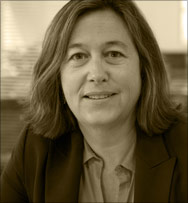 The University of Southern California's Center for Body Computing is the latest to set up an incubator/accelerator for wireless and digital health startup businesses.
The University of Southern California's Center for Body Computing is the latest to set up an incubator/accelerator for wireless and digital health startup businesses.
CBC Founder and Executive Director Dr. Leslie Saxon dropped this news Friday morning as she opened the center's sixth annual Body Computing Conference on the USC campus in Los Angeles.
Plans are still in the early stages, and the school is not going to rush. "We want to create something real, not just a name on a building," Saxon elaborated in an email to MobiHealthNews. "So we have been in discussions with different USC schools, centers, and experts. We've been concentrating on creating an effective organizational innovation structure that fits our ideals."
Saxon said the planned "acceleration center" will be looking for scalable innovations to solve various health problems, either from within USC or from people who have approached the Center for Body Computing for assistance.
"We are a very organic organization and we have a start-up mentality and innovators realize that we get things done," Saxon said. "More and more innovators are coming to us because of our stellar reputation so we felt we needed to create an innovation structure for different digital health solutions, including drug product lines."
She stressed the multidisciplinary, collaborative spirit that the CBC has tried to foster since its establishment in 2010 and that Saxon has been pushing since before she held the first Body Computing Conference in 2007. "Innovators come to us for a variety of reasons, including our ability to bring a multidisciplinary approach to a product idea and our deep medical expertise," Saxon added.
Last week, Lisa Suennen a founding partner of healthcare investment firm Psilos Group Managers, wrote that the health IT industry is at risk of being flooded with incubators and accelerators supporting too many mediocre companies. "All you need is an iPhone, a Starbucks card and a golden retriever and you can declare yourself a cloud-based offering that has declared war on the way things have always been done," Suennen offered.
Saxon conceded that there are a lot of incubators in health IT and the broader healthcare and technology markets, though she suggested that the USC one might be different from some of the incubators in that the university is developing a lot of the ideas in-house.
The proliferation of incubators is not necessarily a bad thing, either. "Yes, it sometimes feels like there is a naïveté among many incubators who don't always appear to go very deep and promise a lot, but isn't it good that people want to change the world for the better?" she asked. "We are the type of center that embraces anything that helps the greater good, from cell therapies to fun apps."
Saxon said that she is still working to identify funding sources and organizational structure for the incubator. "We are very careful about staffing, however. Our organization has a start-up + core expertise + idealistic ethos that we must maintain," Saxon said in the email.
There are plans to commercialize some products that USC researchers and partners are working on, though Saxon is not ready to discuss specifics.

















